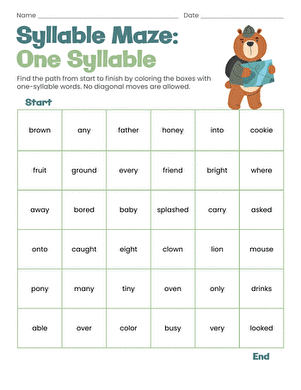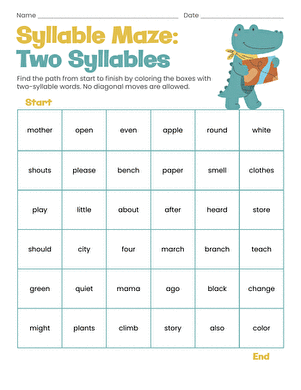Offline Educational Syllables Games
About Offline Educational Syllables Games
On Education.com, offline educational syllable games provide hands-on ways for children to learn byte-by-byte. These classroom- and home-friendly activities include sorting pictures, clapping, tapping chins, and using printable word puzzles to help learners practice dividing words into syllables. These activities promote phonemic awareness, strengthen early reading skills, and build confidence in language while engaging students in multisensory fun.
Explore a wide variety of worksheets, printable activities, and lesson plans on Education.com that feature syllable games to support early literacy. Resources include worksheet pages with split-tongued exercises, rhythm-based clapping challenges, and files with game templates that make learning interactive. Each activity emphasizes parent and teacher involvement, making phonics practice engaging, accessible, and structured.
Try using these syllable games at home or in the classroom to reinforce foundational reading skills. The activities help measure progress, encourage repetition, and make phonemic awareness enjoyable. Educational text segment emphasizes clear instructions, accessible progress monitoring, and inspiration for incorporating multisensory learning into daily reading exercises.
Explore a wide variety of worksheets, printable activities, and lesson plans on Education.com that feature syllable games to support early literacy. Resources include worksheet pages with split-tongued exercises, rhythm-based clapping challenges, and files with game templates that make learning interactive. Each activity emphasizes parent and teacher involvement, making phonics practice engaging, accessible, and structured.
Try using these syllable games at home or in the classroom to reinforce foundational reading skills. The activities help measure progress, encourage repetition, and make phonemic awareness enjoyable. Educational text segment emphasizes clear instructions, accessible progress monitoring, and inspiration for incorporating multisensory learning into daily reading exercises.





